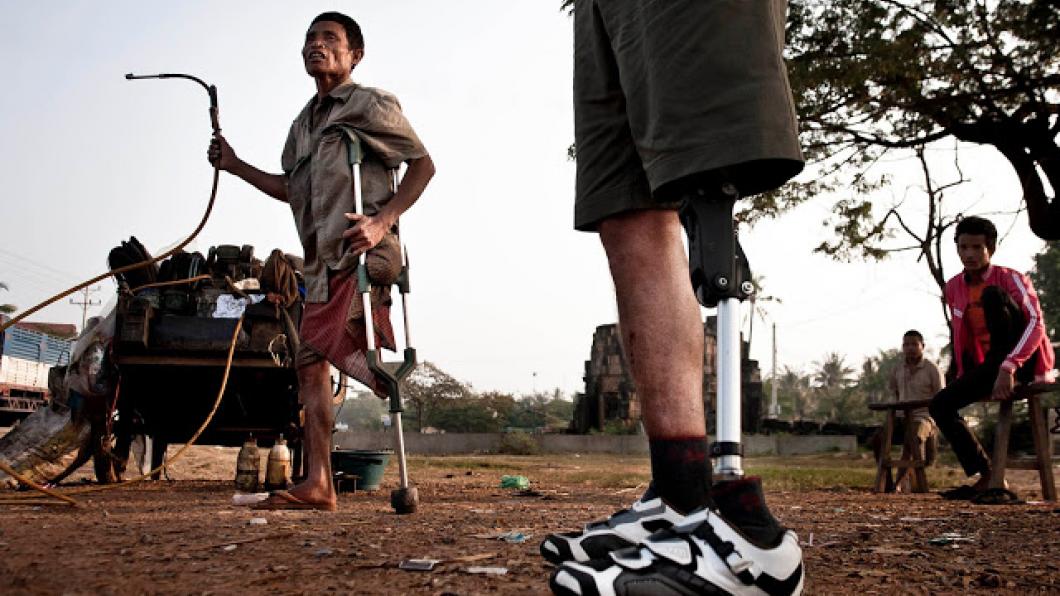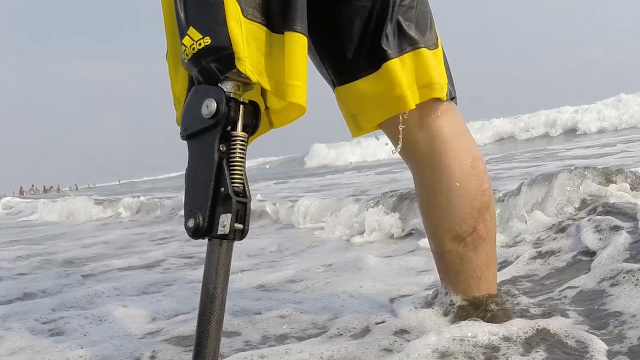
A big idea: Mobility for all
By Louise Kinross
It’s a tough business problem: how do you commercialize a medical product for a niche market that can’t afford it?
For 10 years, Holland Bloorview scientist Jan Andrysek envisioned millions of amputees in the poorest parts of the world regaining their mobility and livelihood with the all-terrain prosthetic knee he invented and developed.
But it wasn’t until American social entrepreneur David Green got involved in 2013 that he found a way forward.
This year Jan and David—along with Emily Lutyens and Brandon Burke—founded LegWorks, a socially-minded business that aims to make high quality prostheses available to amputees worldwide regardless of their ability to pay.
The all-terrain knee is its first product. The knee is sold at market rates in 10 high-income countries so that it can be sold at, or near, cost to non-government organizations, hospitals and rehab clinics in 10 low-income countries. They then provide it at low or no cost to consumers.
“We’ve developed a product for people in the developing world that is also innovative and useful in developed countries,” Jan explains.
The all-terrain knee uses a proprietary locking mechanism that locks the knee when the user extends his leg, preventing falls that occur with traditional knees that require people to place weight on the foot before stabilizing. “Amputees are prone to falling,” says Jan. This is because traditional knee joints lock when the user puts weight on them. “But if they don’t place weight correctly, which happens, the joint may not lock, causing the user to stumble or fall.”
The all-terrain knee is a rugged, high-performance waterproof knee.
About three million people worldwide have above-knee amputations. Most live in the developing world, where less than 15 per cent have a prosthetic. “That means they can’t function,” Jan says. “Most jobs there require manual labour, so they’re unable to work and support themselves or their families.”
Jan published a study this summer of 10 young adults in Chile who wore the all-terrain knee for two years and compared it to their old prosthesis.
Based on walking tests, heart-rate monitoring and questionnaires, Jan’s knee showed a number of advantages. Study participants found the knee improved their stability while standing and walking and made it easier to get around: when wearing the new knee, they expended 40 per cent less energy than they did with the traditional prosthesis. The new knee also supported natural movement in the pelvis, whereas the weight-activated knee caused a pelvic tilt that could create long-term musculoskeletal problems, Jan says.
Nine out of 10 study participants chose to continue using the all-terrain knee following the study.
“In places such as Cambodia, we aim to provide the knee at, or near, cost to non-government organizations who will provide it to low-income individuals,” Jan says. “In developed countries, we provide the knee at prices that coincide with local reimbursement systems.”
The all-terrain knee is sold in Zambia, Colombia, Haiti, Guatemala, Turkey, India and Cambodia. It’s also available in North America, Australia, Europe and Russia. Almost 500 knees have been sold.
Jan notes that while bionic devices based on microprocessors cost over $150,000 in the Western world, most amputees in poor regions can’t afford “the most basic device that doesn’t work well. There is such an inequality.”
Jan says NGOs love the knee because “the technology works well and patients want to keep using it.” One of the challenges in getting the knee to people in the developing world is a lack of prosthetists who are trained to fit them.
Three years ago LegWorks “lucked out with seed funding of $100,000 from Grand Challenges Canada,” Jan says. “To get the funding we had to present how we would translate the technology. Grand Challenges put me in contact with the social entrepreneur David Green.”
Jan learned about David’s model of compassionate capitalism. David helped create a company in India that manufactures artificial lenses used in cataract surgery at a selling price of $4 a pair as opposed to $150 in the U.S. This enables a local hospital to perform over 300,000 free or low-cost cataract surgeries each year.
Jan says he’s excited about advancing science to meet the needs of amputees. “In developing countries people with disabilities are looked down on and excluded,” Jan says. “This leads to even greater poverty. Providing them with a well-working leg gives them the opportunity to regain their lives.”
Photo above by Patrick Brown © 2014 Panos
